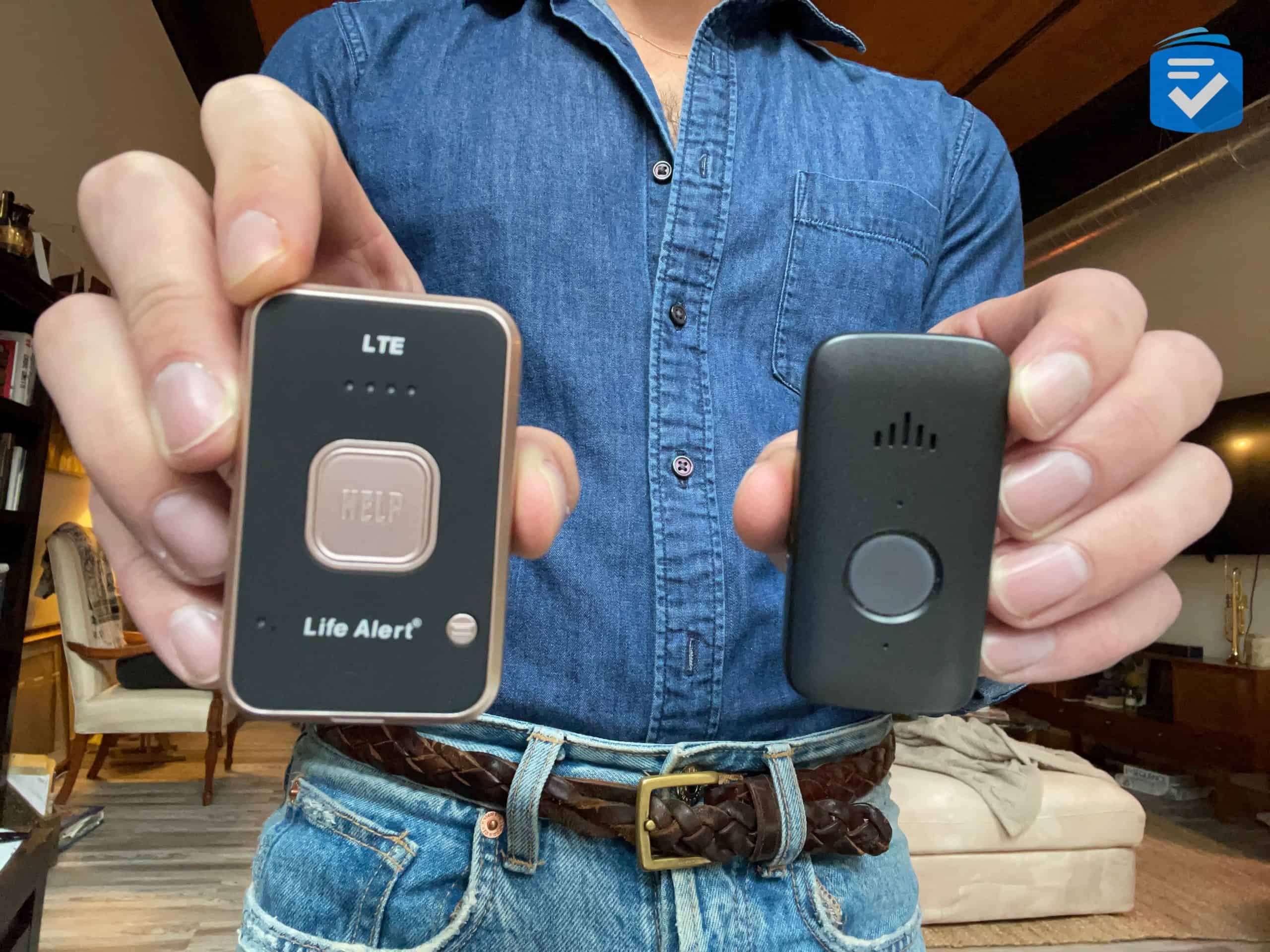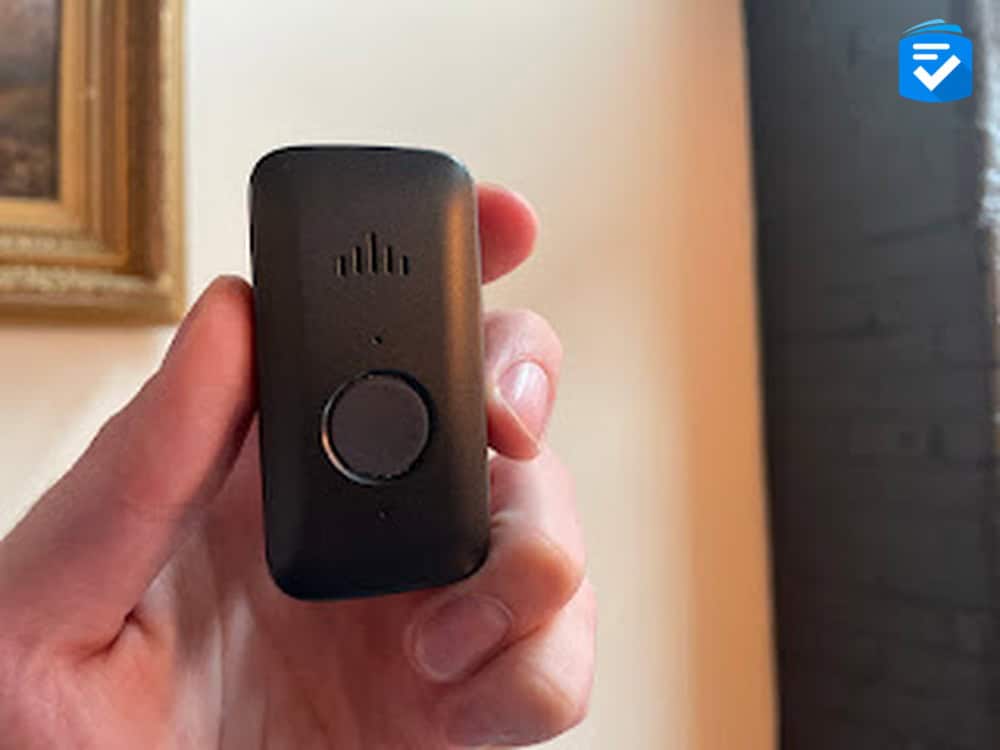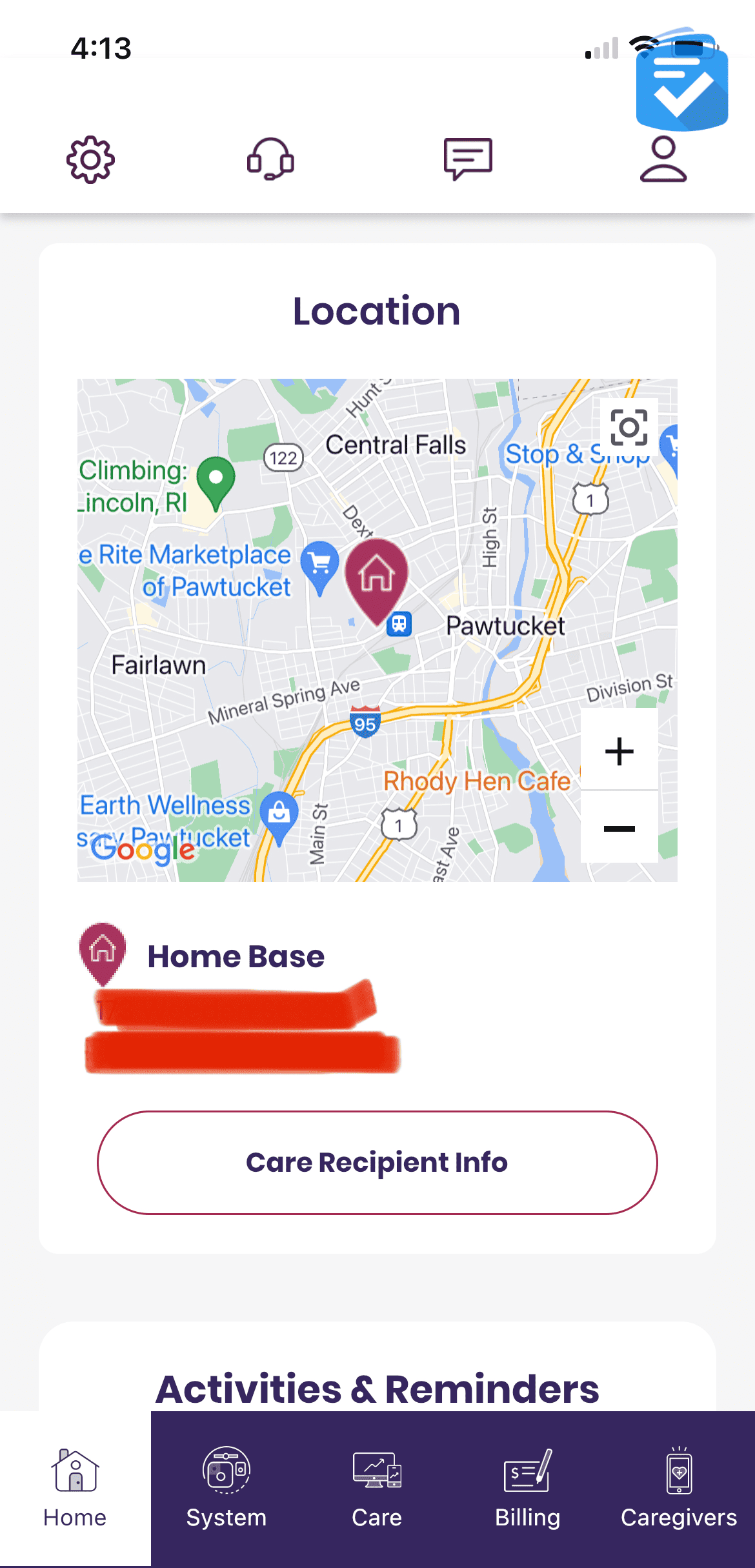Life Alert vs. Medical Guardian: a Hands-On Comparison

If you’ve heard of only one medical alert system company, it’s probably Life Alert. The company’s slogan, “I’ve fallen and I can’t get up!” is one we’ve been seeing on TV for decades. But just because something is popular doesn't mean it’s the best option, which is why we’re comparing Life Alert to Medical Guardian, another leading (if not as famous) provider.
In terms of medical alert providers, Life Alert and Medical Guardian are among the most popular; however, the two differ greatly in terms of devices, costs, and their features.
For most users, we recommend Medical Guardian over Life Alert. In almost every area of comparison, Medical Guardian offers a superior product at a better price. Keep reading to learn about our experience with these two medical alert providers.
FYI: While Medical Guardian is certainly more affordable than Life Alert, it’s not the most affordable medical alert company. To find providers from $20 per month, read our rundown of the best medical alert systems.
Methodology
Here’s how we test and compare medical alert systems:
- Test calls: We stage falls and see how long companies take to respond. In the case of Medical Guardian, we see if the fall detection works or not, placing 10 calls with each system to come up with averages.
- Usability: We make sure the systems are easy to set up and use.
- Customer service: We interact with each companies’ customer support teams and monitoring agents to gauge how kind and helpful they are.
- Pricing and contracts: We prefer companies that do not charge equipment fees and that offer a monthly payment option instead of locking you into a long-term contract.
- Features: Finally, we look for features like fall detection, water resistance, caregiving tracking, and GPS.
Life Alert vs. Medical Guardian: Systems
In terms of the devices themselves, Medical Guardian offers five systems, while Life Alert offers three.

|

|
|
|---|---|---|
| Editor's Ratings | ||
| Starting cost | $69.95 per month | $149.95 for equipment and $27.95 per month (w/annual contract) |
| Contract length | 3 years | 1 month, 4 months, or 1 year |
| Fall detection | Not available | Yes, $10 per month |
| Caregiver portal | Not available | Yes |
| Contact | ||
| Phone Number |
Call for best price:
877-947-4512 |
|
| Website |
Offering more systems is not necessarily better, but it does mean that Medical Guardian can cater to a wider range of users.

The most notable difference would have to be Medical Guardian’s smartwatch, the MGMove.
Life Alert Systems

Life Alert offers a basic in-home system that includes a base unit, a help button, and both pendant and wristband attachments for the help button. To place an emergency call, you press the help button and communicate through the base unit’s speakerphone.
Life Alert also offers a wall-mounted help button and a mobile unit. The wall-mounted help button is made for in-home use. Featuring an adhesive backside and a built-in speakerphone, it’s ideally placed on one’s nightstand, beside the stairs, or near the shower.

The mobile unit features a built-in GPS and speakerphone, allowing you to take the device outside of the home. Most notably, this mobile unit has a disposable battery that Life Alert claims will last up to 10 years. We can’t confirm this, as we’ve only had our device for one year, but it still functions as of this writing. Compare this to most mobile medical alerts that have rechargeable batteries that last for several days before requiring a charge.
Did You Know: Life Alert’s mobile unit has a long battery life, but it’s far from our favorite. To find mobile medical alerts with fall detection, caregiver apps, and health tracking, check out our rundown of the best GPS medical alerts.
Medical Guardian Systems

Similar to Life Alert, Medical Guardian has in-home systems (both landline and cellular) as well as mobile systems (the MGMini, the MGMini Lite, and the MGMove). On paper, these systems will function identically to Life Alert’s (we’ll get to the actual performance later).
One thing that Life Alert does not offer is any type of smartwatch medical alert. Medical Guardian’s MGMove, by contrast, provides medical alert functionality in the discreet profile of a watch. The MGMove can also track your steps and send messages to loved ones.
Overall, with the exception of the smartwatch, Life Alert and Medical Guardian offer relatively similar devices; however, they perform slightly differently.
Life Alert vs. Medical Guardian: Response Times
At their core, medical alert systems are devices made for emergency communications. Whether they are used at home or on the go, a medical alert’s primary function is to connect the user to emergency response agents. Because of this, we always test exactly how long a system takes to connect a user to help.
Across all of Medical Guardian’s different systems, we found that their monitoring center picked up our distress calls in an average of eight seconds. This is one of the fastest average response times we’ve seen across all medical alert providers, and it makes us feel comfortable recommending Medical Guardian to any type of user.
Life Alert, on the other hand, took far longer to respond. In our tests across their devices, we found that Life Alert took an average of two minutes to answer our distress calls. While two minutes might not seem like a long time, it’s far longer than any other medical alert system we’ve tested.
To learn more about our tests, read our Medical Guardian review or our Life Alert review.

To watch one of our Life Alert tests, watch the video below.
Life Alert vs. Medical Guardian: Features
In terms of features beyond emergency calls, Medical Guardian systems once again triumph over Life Alert’s.
All Medical Guardian systems are compatible with fall detection, which can automatically sense when a user falls and place a call to the monitoring center. While this service does cost an extra $10 per month, it’s worth it for many users. Life Alert, however, does not offer this feature on any system. That could be a huge issue, as a study published in the journal BMC Geriatrics found that out of 30 participants who use Personal Emergency Reporting Systems (PERS), only eight had actually pressed their buttons in emergency situations. Some forgot to push the buttons, while some were unable to. That’s why fall detection is so important; you can get help even if you don’t push the button.

Another feature Life Alert does not offer is caregiver tracking. Life Alert’s mobile system does have GPS, but caregivers do not have access to any sort of location data. With Medical Guardian’s MyGuardian app, on the other hand, loved ones can keep track of a user’s device location, battery life, and even step count. Like everyone else, older adults need exercise, at least 150 minutes of moderate aerobic physical activity a week, according to the Centers for Disease Control. So this watch does way more than just fall detection — it can actually improve seniors’ health in other ways.
In terms of extra features, Medical Guardian handily beats Life Alert.
Life Alert vs. Medical Guardian: Costs and Contracts
For many users, the biggest sticking point with Life Alert will be cost, and more importantly, their required contracts. Both companies also charge equipment fees.
For Life Alert, costs start at $69.95 per month. The first $49.95 per month is for the Micro Voice Pendant System, an in-home system that includes a base station and pendant. With this system, you must purchase either a wall-mounted help button or a portable pendant, each of which costs an additional $20 a month. This brings costs up to a minimum of $69.95 per month.
In addition to these steep monthly fees, Life Alert requires one-time payments for their systems:
- Micro Voice Pendant System: $95
- Wall-mounted help button: $198
- On-the-go system: $198
Medical Guardian costs, on the other hand, start at $27.95 per month for the basic in-home landline system. Mobile systems start at $36.95 per month and are paid on either a monthly, quarterly, or annual basis. For equipment, Medical Guardian charges $149.95 for every system except the MGMove smartwatch, which costs $199.95.
No matter which system you choose, Medical Guardian will be the more affordable medical alert system.
Contracts
Arguably, the worst facet of Life Alert would have to be the company’s approach to contracts. While Medical Guardian (and virtually every medical alert provider) allows you to pay on a month-to-month basis and cancel any time, Life Alert locks you into a three-year contract, one that can only be terminated through the user’s death or transition to round-the-clock care.
Not only does Life Alert cost more than Medical Guardian, but they will also lock you into making monthly payments for years to come. While Medical Guardian offers four-month and 12-month contracts with discounted prices, this is just an option, as you are free to make payments on a monthly basis if you prefer.
Our Verdict
In every area we evaluated, Medical Guardian bests Life Alert. Their systems are more affordable than Life Alert’s, they have more features, and they work more efficiently. Because of this, we’d recommend Medical Guardian for any type of user. That being said, if you want to work with a company you’ve heard of before, Life Alert does have an A+ rating from the Better Business Bureau, with a customer rating of 4.75 out of five stars. That’s higher than Medical Guardian’s 3.52 customer rating, although it also has an overall A+ grade. If the prices and lack of fall detection don’t bother you, having Life Alert is better than having no emergency alert system at all.





